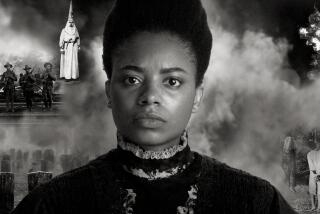BERLIN’S EAST MEETS WEST IN ‘MAN ON THE WALL’
- Share via
“Man on the Wall” (screening at 7 tonight only at Occidental College’s Mosher Theater) is yet another somber, intelligent film from Reinhard Hauff, the West German director best known for “Knife in the Head” and “Black and White Like Day and Night.” Hauff is especially adroit at evoking paranoia, and here he’s working with one of its great enduring symbols, the Berlin Wall. His hero (Marius Muller-Westernhagen) quite figuratively is stuck on the wall that divides East and West Berlin like an ugly scar; he’s a man who goes to extremes to get from East to West only to find himself disillusioned by life in the West, especially in the complications that afflict relationships. He’s left a wife behind whom he loves, yet he’s attracted to a beautiful but somewhat detached young woman (well-played by American actress Julie Carmen); even so, he thinks he wants to return to the East. Eventually he realizes that he doesn’t really want to go back home or stay in the West, but what to do? Working from a script by Peter Schneider, Hauff takes his time in drawing us into his film, but it finally does build to a heartfelt expression of longing for a unified Germany. Tickets: (818) 762-2375.
Maximilian Schell’s provocative “Marlene” at last report still hasn’t an American distributor, so if you missed it at Filmex last year you can catch it at 7:30 tonight only at UCLA Melnitz as part of the comprehensive Contemporary Documentary Series. It plays with Marilyn Waterman’s “Rodin’s Balzac,” which tells the story of the controversy unleashed when the sculptor unveiled his monument to the great writer in 1898.
Interviewed by Schell in her Paris apartment, the reclusive Marlene Dietrich, 83, is heard but never seen, an obstacle Schell deftly incorporates in his film, making it a comment on the nature of documentary and the essential mystery of stardom. (Rumor had it at the 1984 Berlin Film Festival, where it premiered amid considerable lingering hostility toward Dietrich, that it would take no less than $1 million to get her to face the cameras again.) Speaking alternately in German and in English, Dietrich sounds old but is so feisty, so downright impossible at times--at one point she threatens to send her director back to “Mama Schell, so she can teach you some manners!”--that she’s too funny and outrageous to be sad. For that we can be grateful. Phone: (213) 825-2345.
Also screened at last year’s Filmex, Richard Myers’ “Jungle Girl” resurfaces tonight only at 7:30 at the Filmforum, Wallenboyd Center, 301 Boyd St. One of the most gifted and accessible of American experimental film makers, Myers blended his childhood memories of the old Republic “Jungle Girl” and its star Frances Gifford with her own story. Phones: (213) 821-8954, (714) 628-7331.
“Notre Mariage” (UCLA Melnitz Tuesday at 7:30 p.m. only) was shot in Portugal in French by Chilean film maker Valeria Sarmiento in her feature debut and was adapted by Sarmiento and her husband, the far-out Portuguese film maker Raoul Ruiz (responsible for the insufferable “Three Crowns of a Sailor”), from a novel by Corin Tellado, known as Spain’s queen of purple prose. Never mind the film’s complicated international pedigree: “Notre Mariage.” With classic simplicity--and an acute awareness of how fine the line is between grand passion and sheer silliness--the film tells of the conflicting feelings experienced by a beautiful young woman (Nadege Clair) for her adoring, well-off, widowed foster father (Nicolas Silberberg, a lot heavier than he was in “Drugstore Romance”).
More to Read
The biggest entertainment stories
Get our big stories about Hollywood, film, television, music, arts, culture and more right in your inbox as soon as they publish.
You may occasionally receive promotional content from the Los Angeles Times.










